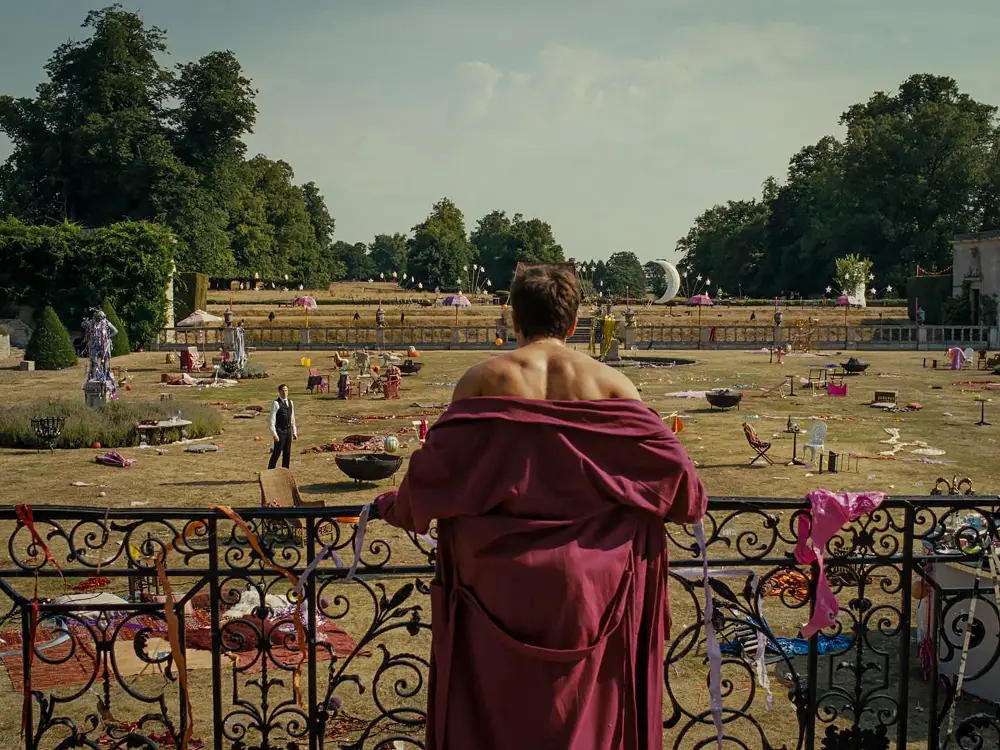So…I watched “Saltburn”. I wouldn’t categorize myself as a movie person at all: whenever I’m asked what my favorite movie is, I have to rack my brain for anything that I have seen in the last three to six months, usually coming up relatively empty. This is to say that I rarely have a burning desire to see anything, but Saltburn quickly invaded my TikTok feed, and, though I knew essentially nothing about it, I knew that I had to see it.
I invited my best friend over, got a six month trial Amazon prime subscription (someone please remind me to cancel that on June 28, lest I be charged for selling my soul to Jeff Bezos in the name of watching one piece of startling cinema), and we started the film. Major spoilers for “Saltburn” ahead, so proceed at your own risk.
Honestly? It’s not as insane as everybody made it out to be. By the reactions to scenes that people were putting up on TikTok, I was expecting to have to prop up my jaw due to the sheer horror of whatever happened in that house, but that wasn’t quite the case. I mean, there were jaw-dropping moments, such as Oliver (Barry Keoghan) drinking Jacob Elordi’s bathwater, or Oliver ****ing a grave (I will never be able to hear Lord of All Hopefulness the same way again), or Oliver dancing around the mansion comple- you know, never mind. Barry Keoghan did some weird stuff for this movie, but I do think that all of the strangely motivated actions of his character were incredibly believable, furthering the feeling of Oliver’s obsession with Felix, even if they were unscripted and improvised.
A standout performance came from Rosamund Pike in the role of a blissfully ignorant high-class woman. A big strength of this movie was the cinematography. It was a visually beautiful movie that gave it an untouchable vibe, dripping with luxury and wealth, much like the family that resided within the Saltburn estate. Though I’ve heard some people call the old-fashioned, square aspect ratio pretentious, I thought it added to the film by planting the viewer firmly in 2006, along with an excellent soundtrack. Though I will unfortunately never be able to listen to Sophie Ellis-Bextor’s “Murder on the Dance Floor” without seeing Barry Keoghan’s — you know what, never mind. Still not going there.
The overall pacing of the movie felt a bit off to me, since they packed much of the action in the movie into the last 30 minutes, which led to some interesting plot holes that seemed way too obvious to simply gloss over. How did the police not figure out that Felix was poisoned? Or connect any of the strange events that happened within this dysfunctional family to the man who had arrived at their house in the last couple of months?

The English major in me particularly appreciated the way that the script framed Felix as Icarus, flying too close to the sun in his desire to be a benefactor for lesser creatures. The Greek mythology theme continues with the image of the Minotaur, a monster that was sentenced to live in a labyrinth, fed by human sacrifices. Theseus, the hero of the myth, kills the Minotaur, ending the human sacrifices, while also manipulating the royal family and gaining all of their power in the end. Sound familiar? On the Saltburn estate, they have a labyrinth with a Minotaur statue in the middle of it, which happens to be sculpted in the image of Barry Keoghan, which muddies the connection between the myth and the film, as it seems like Oliver is supposed to be both the Minotaur, who gains his power from human sacrifices, as well as Theseus, who gains his power from manipulating the royal family.
These mostly thoughtful symbolic elements of plot seemed to deviate from the slightly clumsy nature of the rest of the film. Overall, it seemed like it was trying too hard to be shocking, which was inevitable because it feels like there hasn’t been this kind of movie in mainstream culture for a while. Many of the recently widely-promoted movies, like Barbie, are in stark contrast to the stranger tale that Saltburn spins, yet a lack of focus on the thematic elements of this film led to a misguided message.
It felt like the movie jockeyed between being an obsessive, transgressive one-sided love story, and a beware of the poor narrative, which I find ironic as Emerald Fennell, the director, is an Oxford-educated woman from posh English high society whose father is known as the “King of Bling”. She said in an interview with AnOther Magazine that “Saltburn” is about the “absurdity of class”, but that begs the question: does her position as a person of wealth hinder her ability to write good satire about the absurdities of class and particularly the absurdities of English class dynamics? Obviously this is not something that I am particularly equipped to examine, but her positionality resulted in a lack of nuance that was pervasive throughout the film.
All in all, I wouldn’t say that “Saltburn” was a bad film, but I would be hard pressed to call it a good one. A critique in the style of Great British Bake-Off Judge, Paul Hollywood, would be that it is full of style, yet has very little substance.







